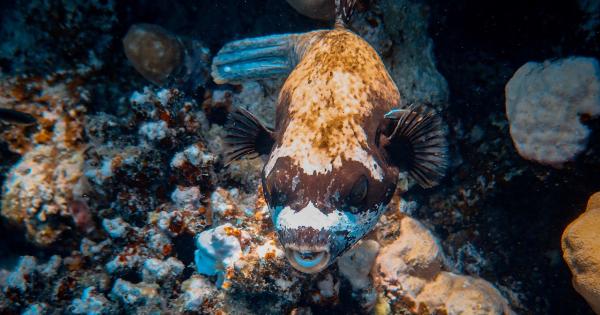Sea water is known for its high salt content, making it impossible to drink without any treatment. However, there are certain cheeses that have the incredible ability to transform the taste of sea water, making it as refreshing as fresh water.
These cheeses possess unique properties that interact with the salt ions, altering their flavor and creating a remarkable culinary experience. In this article, we will explore these cheeses and uncover the science behind their transformative power.
The Science Behind the Cheese-Miracle
Before diving into the specific cheeses, it is important to understand the scientific basis behind this seemingly magical phenomenon. The secret lies in the interaction between the compounds present in the cheeses and the salt ions present in sea water.
The main compound responsible for this transformation is sodium citrate, a salt of citric acid that acts as an emulsifier and stabilizer.
Sodium citrate has the remarkable ability to bind with the salt ions in sea water, effectively neutralizing their taste.
This binding process results in a drastic reduction in the saltiness of the water, making it taste remarkably similar to fresh water. Additionally, the compounds in the cheeses also contribute to masking any residual saltiness, enhancing the overall taste transformation.
Gouda: The Taste Transformer
Gouda, a popular Dutch cheese, is widely recognized for its distinct taste and creamy texture. However, it is also renowned for its unique ability to alter the flavor of sea water.
The higher fat content and the specific enzymes present in Gouda play a significant role in neutralizing the saltiness of sea water. The result is a surprisingly refreshing sensation that resembles the taste of fresh water.
Camembert: Transcending Salinity
This classic French cheese is renowned for its creamy, soft texture and rich flavor.
But did you know that Camembert can also make sea water taste like fresh water? The specific strains of Penicillium camemberti mold that are used to create this cheese produce enzymes that effectively interact with the salt ions in sea water, reducing the saltiness to an undetectable level. This unique attribute has made Camembert a sought-after cheese among culinary enthusiasts.
feta: Transforming the Seascape
Feta cheese, originating from Greece, is traditionally made from sheep or goat’s milk, giving it a distinct tangy flavor and a crumbly texture.
When added to sea water, feta effectively binds with the salt ions, significantly reducing their concentration and creating a refreshing taste that rivals the freshness of natural spring water. Feta’s unique combination of properties makes it an ideal choice for transforming the taste of sea water.
Brie: A Journey from Sea to Spring
Brie cheese, famous for its soft, creamy texture and earthy flavor, is yet another cheese that possesses the ability to alter the taste of sea water.
The natural enzymes present in Brie interact with the salt ions, converting them into less potent compounds that no longer create a saline taste. The result is a truly remarkable transformation, taking the palate on a journey from the sea to a freshwater spring.
Roquefort: The Salinity Slayer
Roquefort, a distinctive blue cheese hailing from France, is well-known for its rich, salty taste and characteristic blue veins. Surprisingly, this cheese also has the power to make sea water taste like fresh water.
Roquefort possesses enzymes and compounds that effectively break down salt ions, neutralizing their flavor profile. The complex flavors of Roquefort combined with its salt-reducing abilities provide a truly unique gustatory experience.
Cheddar: A Chaser for Saltiness
Cheddar cheese is one of the most widely consumed cheeses globally, loved for its sharp, nutty taste and smooth texture. Beyond its culinary appeal, cheddar has the ability to mitigate the saltiness of sea water.
The enzymes present in cheddar bind with the salt ions, effectively neutralizing their impact on the taste buds. As a result, sea water infused with cheddar becomes refreshing and remarkably close to the taste of fresh water.
Emmental: Neutralizing the Brine
Emmental cheese, popular for its characteristic large holes and nutty flavor, is yet another variety that can make sea water taste like fresh water.
The higher calcium content and specific enzymes in Emmental effectively neutralize the salt ions, allowing the true freshness of water to prevail. This unique property of Emmental has made it a cheese of choice in regions where desalination of seawater is difficult or costly.
Gorgonzola: Taming the Brackish
Gorgonzola, a revered Italian blue cheese, is renowned for its pungent aroma and sharp flavor. In addition to its gastronomic attributes, Gorgonzola possesses the ability to tame the brackishness of sea water.
The enzymes and mold present in this cheese interact with the salt ions, reducing their potency and transforming the taste into that of freshwater. Gorgonzola’s complex profile, combined with its salt-reducing capabilities, creates a unique experience for cheese lovers.
Parmesan: From Salty to Savory
Parmesan cheese, a staple of Italian cuisine, is prized for its granular texture and distinctive, savory flavor. Beyond its culinary applications, Parmesan can also transform the saltiness of sea water, making it taste closer to fresh water.
The enzymes and compounds in Parmesan efficiently bind with the salt ions, reducing the salinity and bringing out the inherent savory notes of the water. The result is a fascinating culinary experience where the sea transforms into a savory spring.
Conclusion
The cheeses mentioned above possess extraordinary properties that allow them to make sea water taste like fresh water.
These cheeses not only enhance the taste of culinary dishes but also showcase the remarkable potential of food science in transforming the palatability of basic resources. From Gouda to Parmesan, each cheese brings its unique flavor profile and beneficial properties to the table, creating a transformative and unforgettable gustatory journey.































